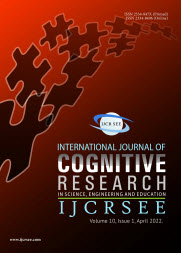Visual Discrete Format: An Alternative to Likert-Type Formats of Survey Items Sensitive Enough to Measure Small Changes in Stable Constructs Such as Self-Concept in Science
Visual Discrete Format: An Alternative to Likert-Type Formats of Survey Items Sensitive Enough to Measure Small Changes in Stable Constructs Such as Self-Concept in Science
Author(s): Daniel H. Solis, David Hutchinson, Nancy LongneckerSubject(s): Cognitive Psychology
Published by: Удружење за развој науке, инжењерства и образовања
Keywords: Likert-type scale; visual discrete scale; visual discrete format; self-concept in science; scientific literacy; questionnaire
Summary/Abstract: A visual discrete format was developed for use in surveys as an alternative to a Likert-type format to measure changes in a relatively stable construct before and after an intervention. Visitors to a science centre ranging in age from 8 years old upwards were asked to complete surveys that included a seven-item questionnaire scale on self-concept in science using either the Likert-type format (n=446) or the visual discrete format (n=375), before and after their visit. A new set of statements to assess self-concept in science were developed and validated so they could be conducted on either format. Matched responses were used to calculate internal consistency, standard deviation, confidence interval and percentage of missing values; these were all similar for both formats. In the visual discrete format, text labels were replaced by visual labels with a single image of different size for each response option. While a Likert-type format describes a level of agreement/disagreement with a specific item, the visual discrete format relates more to choosing the best reflection of the self in relation to that item. The Likert-type format included a set of emoji in its descriptions to appeal to younger participants. The visual discrete questionnaire scale detected a small increase with medium effect size in self-concept in science after the visit to the science centre while the Likert-type questionnaire scale did not detect any change. This suggests the proposed new format can not only be a viable and useful alternative, but potentially more sensitive under certain conditions.
Journal: International Journal of Cognitive Research in Science, Engineering and Education (IJCRSEE)
- Issue Year: 10/2022
- Issue No: 2
- Page Range: 1-16
- Page Count: 16
- Language: English

